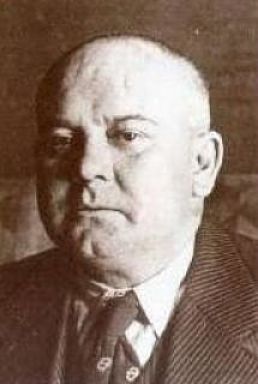Joan Peiró facts for kids
Quick facts for kids
Joan Peiró
|
|
|---|---|
 |
|
| Secretary General of the Confederación Nacional del Trabajo | |
| In office 1922 – July 1923 |
|
| Preceded by | Joaquín Maurín |
| Succeeded by | Paulino Díez |
| In office 1927 – May 1929 |
|
| Preceded by | Segundo Blanco |
| Succeeded by | Ángel Pestaña |
| Minister of Industry | |
| In office 4 November 1936 – 17 May 1937 |
|
| Preceded by | Anastasio de Gracia |
| Personal details | |
| Born |
Joan Peiró Belis
18 February 1887 Barcelona, Spain |
| Died | 24 July 1942 (aged 55) Paterna, Valencia, Spain |
| Cause of death | Execution |
| Resting place | Mataró, Barcelona, Spain |
| Citizenship | Spanish |
| Nationality | Catalan |
| Political party | Confederación Nacional del Trabajo |
| Spouse | Mercè Olives |
| Children | Aurora, Aurèlia, Guillermina, Mercè, Joan, Josep y Liberto Peiró |
| Occupation | Syndicalist, Politician |
Joan Peiró i Belis (also known as Juan Peiró) was an important person in Spain during the early 1900s. He was a Catalan activist and writer. He also worked as an editor for an anarchist newspaper called Solidaridad Obrera.
Peiró was a leader in a big workers' organization. This group was called the Confederación Nacional del Trabajo (CNT). He served as its Secretary General twice. Later, he became a Minister of Industry for the Spanish government. This happened during the difficult time of the Spanish Civil War.
Contents
Joan Peiró's Early Life and Work
Joan Peiró was born in Barcelona, Spain, in 1887. He spent most of his life in Mataró, a town near Barcelona. He worked as a glass worker for his whole life. He was employed at a special glass factory called Cristalleries de Mataró. This factory was run as a cooperative, meaning the workers shared in its ownership and profits.
His Role in Spanish Politics
Peiró was an anarchist. Anarchists believe in societies without a government. However, Peiró sometimes took actions that seemed different from typical anarchist ideas. In 1930, he signed a document that asked for a republic in Spain. A republic is a country governed by elected officials, not a king.
This decision caused some debate within the CNT. Peiró later said he had changed his mind. He stated he still believed strongly in anarcho-syndicalism. This idea combines anarchist beliefs with workers' unions.
In 1931, Peiró signed another important document. It was called the Manifiesto de los Treinta. This paper criticized some of the more extreme anarchist groups. Because of this, he was temporarily removed from the CNT.
Serving in the Government
The Spanish Civil War began in 1936. On November 4, 1936, Joan Peiró joined the Spanish government. He became the Minister of Industry. Three other leaders from the CNT also joined the government.
As Minister, Peiró tried to make big changes. He wanted to make all of Spain's industries work together. This idea is called collectivization. It means workers would own and control the factories. His plans were changed many times. In the end, the final law did not include much of his original idea.
Peiró left his position as Minister on May 17, 1937. He later returned to the government. He worked as the Commissioner of Electricity.
A Difficult End
The Spanish Republic fell in 1939. Peiró had to leave Spain and went to France. However, the government in France at the time, called the Vichy Regime, handed him over to Nazi Germany.
The German secret police, the Gestapo, then gave him to the Franco government in Spain. In 1942, Joan Peiró was put to death.
Remembering Joan Peiró
Joan Peiró is still remembered today. In Barcelona, a public square is named after him. It is next to the main train station.
In 2002, people in Mataró held a special event. It marked 60 years since Peiró's death. The event took place at the cemetery where he is buried. His daughter, Guillermina Peiró, was there. Leaders from a workers' union, the Confederación General del Trabajo (CGT), also attended. The Mayor of Mataró, Manuel Mas, was present too.
During the ceremony, a red and black flag was placed on his tomb. This flag is a symbol often used by anarchists. People also sang To the Barricades, which is the anthem of the CNT.
Joan Peiró's son, Josep, also became a leader of the CNT. He led the group from outside Spain after the Civil War. He had fought in the war as part of a group called the Ascaso Column.
See also
 In Spanish: Juan Peiró para niños
In Spanish: Juan Peiró para niños
 | Ernest Everett Just |
 | Mary Jackson |
 | Emmett Chappelle |
 | Marie Maynard Daly |

